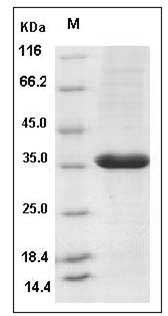-
Product Name
Human PCNA (His Tag) recombinant protein
- Documents
-
Description
Auxiliary protein of DNA polymerase delta and is involved in the control of eukaryotic DNA replication by increasing the polymerase's processibility during elongation of the leading strand. Induces a robust stimulatory effect on the 3'-5' exonuclease and 3'-phosphodiesterase, but not apurinic-apyrimidinic (AP) endonuclease, APEX2 activities. Has to be loaded onto DNA in order to be able to stimulate APEX2. Plays a key role in DNA damage response (DDR) by being conveniently positioned at the replication fork to coordinate DNA replication with DNA repair and DNA damage tolerance pathways (PubMed:24939902). Acts as a loading platform to recruit DDR proteins that allow completion of DNA replication after DNA damage and promote postreplication repair: Monoubiquitinated PCNA leads to recruitment of translesion (TLS) polymerases, while 'Lys-63'-linked polyubiquitination of PCNA is involved in error-free pathway and employs recombination mechanisms to synthesize across the lesion.
-
Protein name
Proliferating cell nuclear antigen
-
Protein short names
RP23-33N15.1; MGC8367; ATLD2
-
Uniprot ID
P12004
-
Gene Name
PCNA
-
Source/Expression Host
Baculovirus-Insect Cells
-
Expression Plasmid/cDNA
A DNA sequence encoding the mature form of human PCNA (P12004) (Met 1-Ser 261) was expressed, with a polyhistidine tag at the N-terminus.
-
Protein Species
Human
-
Molecular weight
The recombinant human PCNA consists of 280 amino acids and has a calculated molecular mass of 31 kDa. It migrates as an approximately 36 kDa band in SDS-PAGE under reducing conditions.
-
Purity
> 90 % as determined by SDS-PAGE
-
Validations

Human PCNA Protein (His Tag) SDS-PAGE
Related Products / Services
Please note: All products are "FOR RESEARCH USE ONLY AND ARE NOT INTENDED FOR DIAGNOSTIC OR THERAPEUTIC USE"
